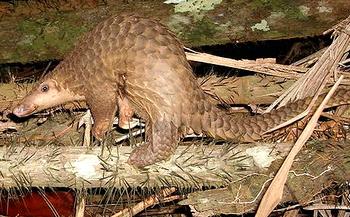
BANGKOK, Thailand, September 3, 2012 (ENS) – Forty people have been arrested in five Southeast Asian countries in the largest coordinated operation against the illegal poaching and trade in pangolins, nocturnal mammals that feed on termites and other insects.
Operation Libra, coordinated by Interpol’s Environmental Crime Programme, took place in June and July and involved investigations and enforcement actions across Indonesia, Laos, Malaysia, Thailand and Vietnam.
Supported by the Bangkok-based Freeland Foundation through a grant from USAID, the operation led to the arrest of more than 40 individuals, with some 200 additional cases currently under investigation across the region.
David Higgins, head of Interpol’s Environmental Crime Programme said, “Operation Libra is an outstanding example of the results that can be achieved through international cooperation in addressing the trafficking of one of the world’s most vulnerable animals.”

“But unless we build on the momentum started by this operation and identify and prosecute those controlling the trade, it is highly likely we will see the extinction of pangolins in many regions,” said Higgins.
Pangolins are found across most of Asia and Africa. The nocturnal mammals feed on insects using a well-developed sense of smell to locate their prey. During the day, and for protection, pangolins curl into a ball, protected by large scales which cover their bodies.
Pangolins are poached and illegally traded by the thousands, due to a high demand for their scales, which are used in traditional medicine, and their meat, which is considered a delicacy.
During Operation Libra, conducted with the assistance of the World Customs Organization and the ASEAN-Wildlife Enforcement Network, enforcement agencies conducted raids on restaurants and other premises across the region.
Some 1,220 pangolins were recovered, almost half of them still alive. In addition to pangolins, birds, snakes and eight tiger cubs were also seized in the raids.
In one case, as a result of close international cooperation, Indonesian authorities discovered a shipment of frozen pangolins bound for Vietnam.

Interpol’s I-24/7 secure communications system was used and additional assistance provided by the World Customs Organization to track the shipment to Hai Phong, Vietnam, where it was intercepted by customs officers.
The shipment was found to contain 260 cartons of frozen pangolins weighing five tonnes in total. The two countries are working together to identify the suspects.
All eight species of pangolin are protected under national laws, and are also covered by the Convention on International Trade in Endangered Species, an international treaty.
Still, thousands of illegally traded pangolins are seized every year. While some of the animals are found alive, their chances of survival are poor due to harsh transportation conditions and their release in unsuitable environments.
Because of their reclusive nature, the impact of the illegal trade on the pangolins and their habitats is difficult to assess, but some Southeast Asian forests are believed to be nearly devoid of pangolins, Interpol said in a statement announcing the results of Operation Libra.
China is cracking down on pangolin smugglers. In May, Tengchong County People Court in China’s Yunnan Province sentenced two men to 10 years each in jail and fined them CNY8,000 for their part in smuggling 42 pangolins in November 2011.
Also in May Shenzhen Bay Customs seized 25.4 kg of pangolin scales from a passenger on a shuttle bus from Hong Kong to Shenzhen. The Chinese passenger arrested said he had obtained the scales when he worked in Pakistan and planned to sell them in China. The case is under investigation.

In June, Beijing Airport Customs confiscated 42 kg of pangolin scales and 310 grams of rhino horn, carried by two Chinese nationals arriving from Doha, Qatar.
In April, Vietnamese enforcement authorities seized 71 live pangolins in Nghe An Province on the north central coast of Vietnam after receiving a tip that a car was transporting the endangered species.
“Countries with wild pangolin populations and those key to the on-going illegal trade are ramping up efforts to combat the problem,” said Dr. Naomi Doak, Greater Mekong Programme Coordinator for the nonprofit wildlife traffic monitoring network, TRAFFIC.
“However, without stricter enforcement of current laws and tougher sentences for illegal wildlife traders, the future for this species in Asia looks very bleak,” said Dr. Doak.
In 2010, TRAFFIC Southeast Asia reported that just one syndicate in Sabah, Malaysia was responsible for trafficking 22,000 pangolins over an 18-month period.
TRAFFIC is urging authorities to incinerate any dead pangolins and transfer those still alive to a rescue center, to ensure no one profits from the crimes.
In response to threats to pangolin populations in both Africa and Asia, including persistent illegal trade, the International Union for Conservation of Nature Species Survival Commission (IUCN-SSC) Pangolin Specialist Group was re-formed this year.
“The IUCN-SSC Pangolin Specialist Group aims to further our understanding of pangolins and the threats they face,” said Dan Challender, co-Chair of the re-formed group and a researcher studying pangolin trade in Asia, based at the University of Kent’s Durrell Institute of Conservation and Ecology.
The group’s mission is to “be a global voice for pangolins by working to advance knowledge and understanding of pangolins worldwide, their conservation, natural history and ecology and to catalyze action to meet these needs.”
“The formation of this Specialist Group is a great step forward” said Chris Shepherd, deputy regional director of TRAFFIC in Southeast Asia. “Bringing together a wide range of expertise and dedicated people to focus on the conservation of these amazing animals is key to their long term survival.”
© 2012, Environment News Service. All rights reserved. Content may be quoted only with proper attribution and a direct link to the original article. Full reproduction is prohibited.
